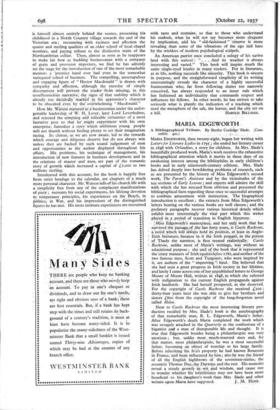MARIA EDGEWORTH - . •
A Bibliographical Tribute. By Bertha Coolidge -Slade. (Con- stable. 42s.)
MARIA EDGEWORTH, then twenty-eight, began het writing with Letters for Literary Ladies in 1795 ; she ended her literary career in 1848 with Orlandino, a story for children. In Mrs. Slade's beautifully produced work, Maria's work receives the exhaustive bibliographical attention which it merits in these days of an awakening interest among the .bibliophiles in early children's books and in early nineteenth-century editions. Mrs. Slade has delved deeply into bewildering problems of research, such as are presented by the history of Miss Edgeworth's second work, The Parent's Assistant and by the vicissitudes of the ten sections of Early Lessons ; and experts will admire the skill with which she has rescued 'from oblivion and presented the bibliographical facts regarding these once so successful attempts to combine amusement with instruction. The biographical introduction is excellent ; the extracts from Miss Edgeworth's letters bearing on the various books are well chosen; and the prefatory paragraphs recover various historical details which exhibit most interestingly - the vital part which this writer played in a period of transition in English literature.
Miss Edgeworth% masterpiece and her only work that has survived the passage:of -Jhe'last -forty -years, is Castle .Raekrent, ' a novel Which will ahciays. hold position, at least in Anglo- ! Irish- literature, because in_ it the _Irish peasant, in the person of Thady - the narrator, - is first *treated -realistically,' Castle I Rackrent, unlike most of ,Maria's writings, was .without an educational purpose ; she said of the book that it represented the 'crazy ma" liners of Irish squire; before 1782, and neither of the two famous men, Scott and Tut. genev, who were inspired by it, are authors of the -" improving.! kind.-, She believed -that she had seen a greai progress in Irish:society in her-lifetime, and lately I came across one of her unpublished letters to George Moore of Moore Hall, written in 1848, in which she referred with indignation to the current English propaganda against Irish landlords. She had herself prospered, as. she deserved. For the copyright of Castle Rackrent " she received kroo ; thirty-four years later she was able to give her brothers and sisters £600 from the copyright of the long-forgotten novel called Helen.
Next to Castle Rackrent the most interesting literary pro- duction recalled by Mrs. Slade's book is the autobiography of that remarkable man, R. L. Edgeworth, Maria's father. After Edgeworth's death Maria completed the work which was savagely attacked in the Quarterly as the confessions of a bigamist and a man of disreputable life and thought. It is true that Edgeworth besides being a philanthropist was very uxorious ; but, unlike, most much-married men and, for that matter, most philanthropists," he was a most successful father, becoming an object of worship to his large family. Before inheriting his Irish property he had known Rousseau in France, "and.heen influenced by him; also he was the friend of all the English highbroWs of the seventeen-sixties, the eccentric Thomas Day, the Darwins and the rest. His memoirs reveal a steady growth - in: wit, and wisdom, and cause one to wonder whether liis' inierference may not have been more
' beneficial--to- his daughter's work than Mrs.- Slade. and other
writers- upon Maria have supposed. l.- M. HONE.






























































 Previous page
Previous page